陈述句的否定形式
陈述句变否定句一般疑问句特殊疑问句及练习
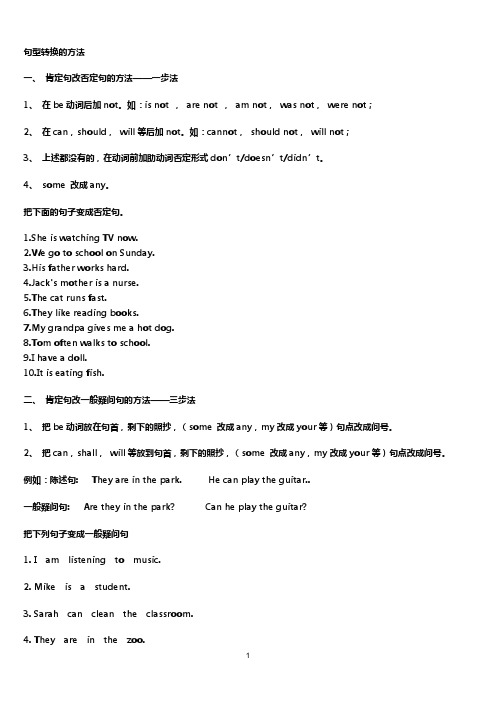
句型转换的方法一、肯定句改否定句的方法——一步法1、在be动词后加not。
如:is not , are not , am not, was not, were not;2、在can,should, will等后加not。
如:cannot, should not, will not;3、上述都没有的,在动词前加助动词否定形式don’t/doesn’t/didn’t。
4、 some 改成any。
把下面的句子变成否定句。
1.She is watching TV now.2.We go to school on Sunday.3.His father works hard.4.Jack's mother is a nurse.5.The cat runs fast.6.They like reading books.7.My grandpa gives me a hot dog.8.Tom often walks to school.9.I have a doll.10.It is eating fish.二、肯定句改一般疑问句的方法——三步法1、把be动词放在句首,剩下的照抄,(some 改成any,my改成your等)句点改成问号。
2、把can,shall, will等放到句首,剩下的照抄,(some 改成any,my改成your等)句点改成问号。
例如:陈述句: They are in the park. He can play the guitar..一般疑问句: Are they in the park? Can he play the guitar?把下列句子变成一般疑问句1. I am listening to music.2. Mike is a student.3. Sarah can clean the classroom.4. They are in the zoo.5. There are some flowers in the vase.6.This is my sister.7.We are sweeping the floor.3、上述都没有的,在句首请助动词Do/Does/Did帮忙,剩下的照抄,(some 改成any,my改成your等)句点改成问号。
陈述句变否定句及疑问句
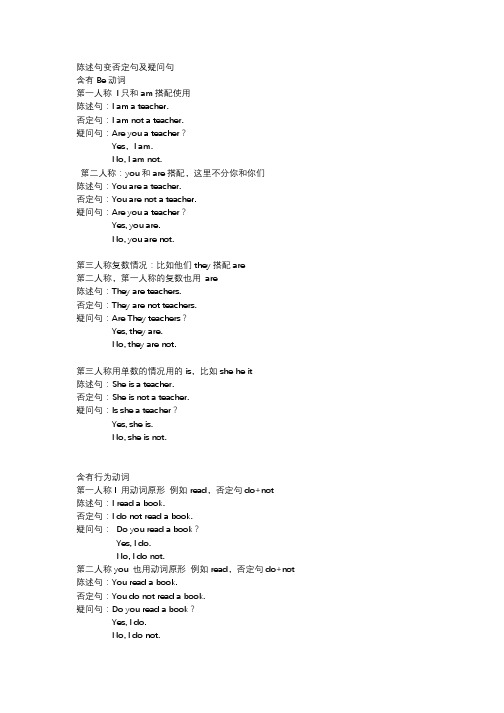
陈述句变否定句及疑问句含有Be动词第一人称I只和am搭配使用陈述句:I am a teacher.否定句:I am not a teacher.疑问句:Are you a teacher?Yes,I am.No, I am not.第二人称:you和are搭配,这里不分你和你们陈述句:You are a teacher.否定句:You are not a teacher.疑问句:Are you a teacher?Yes, you are.No, you are not.第三人称复数情况:比如他们they搭配are第二人称,第一人称的复数也用are陈述句:They are teachers.否定句:They are not teachers.疑问句:Are They teachers?Yes, they are.No, they are not.第三人称用单数的情况用的is,比如she he it陈述句:She is a teacher.否定句:She is not a teacher.疑问句:Is she a teacher?Yes, she is.No, she is not.含有行为动词第一人称I 用动词原形例如read,否定句do+not陈述句:I read a book.否定句:I do not read a book.疑问句:Do you read a book?Yes, I do.No, I do not.第二人称you 也用动词原形例如read,否定句do+not 陈述句:You read a book.否定句:You do not read a book.疑问句:Do you read a book?Yes, I do.No, I do not.第三人称复数they 也用动词原形read ,否定句直接加not陈述句:They read a book.否定句:They do not read a book.疑问句:Do they read a book?Yes, they do.No, they do not.第三人称单数she 要用动词的复数形式reads。
陈述句改否定句的方法
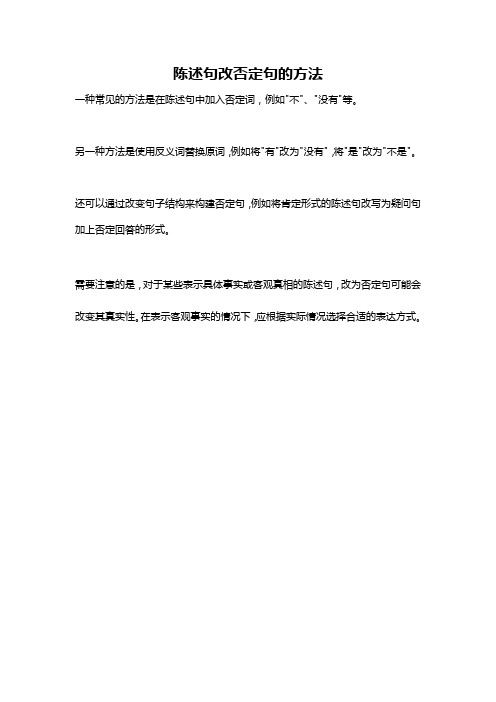
陈述句改否定句的方法
一种常见的方法是在陈述句中加入否定词,例如"不"、"没有"等。
另一种方法是使用反义词替换原词,例如将"有"改为"没有",将"是"改为"不是"。
还可以通过改变句子结构来构建否定句,例如将肯定形式的陈述句改写为疑问句加上否定回答的形式。
需要注意的是,对于某些表示具体事实或客观真相的陈述句,改为否定句可能会改变其真实性。
在表示客观事实的情况下,应根据实际情况选择合适的表达方式。
陈述句变否定句
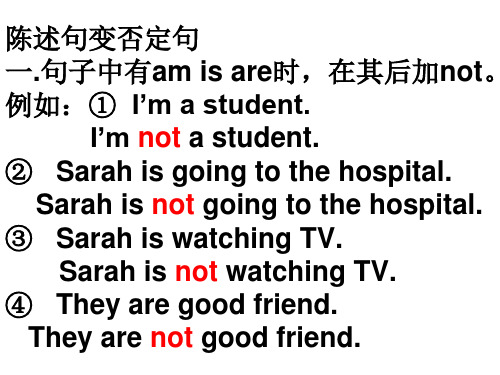
二. 句子中有can will时,在其后加not。 例:He can swim. He can not swim. I will go to the park. I will not go to the park. 练习: (1)Tiger can run fast. (2)They will make a snowman. (3)Amy will take a dancing class. (4)She can go ice-skating. (5)Aunt will cook dinner.
三. 句子中无am is are can will。 1. 动词为原形时,在动词前加don’t。 例:I go to school by bike. I don’t go to school by bike. 练习: (1)They eat lunch at school. (2)I have to do my homework. (3)Boys play football at noon. (4)I want to send it today. (5)Three pandas eat bamboos.
2. 动词为单三形式时,在动词前加 doesn’t , 动词单三形式变原形。 例:He eats breakfastห้องสมุดไป่ตู้at home. He doesn’t eat breakfast at home. Mike goes to bookstore by bus. Mike doesn’t go to school by bus. 练习:(1)She wants to eat noodles. (2)Mr Zhang has to wash clothes. (3)Jack makes mooncakes for me. (4)John wears a life jacket. (5)The elephant drinks water .
初中英语句子种类之陈述句
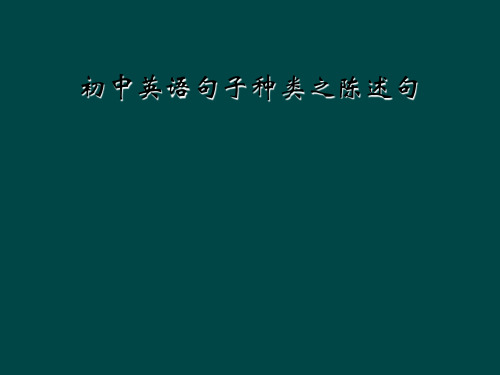
3、否定词no, never, hardly, seldom, little, few等也可 以构成陈述句的否定形式。
一定句 变 否定句
1、含有some, something, somebody的一定句变为否定句 时,应把这些词分别改为any, anything, anybody.
练习
1、 Emma does her homework every evening.(变为否定句) Emma ________ her homework every evening.
2、 Cao Hua swims fastest in our group.(变为否定句) Cao Hua __________ fastest in our group.
词+实义动词”“情态动词+实义动词” “系表结构”等。
陈述句的否定形式
1、如果句子的谓语含有be动词(am, is, are, was, were)、 助动词(will, shall, would, should, have, has, had)或 情态动词(can, may, must等),其否定形式是在它们之后加 not构成。
2、含有always是我一定句变为否定句时,必须把always 换成never.
3、含有both, all, everything, everyone(everybody) 的一定句变为否定句时,必须把这些词分别改为neither, none, nothing, no one(nobody).
4、当陈述句是“I think(认为)/believe(相信)...+ 宾语从句”时,若否定宾语从句,习惯上要将否定前移到主句 的谓语动词think/believe等前。即“I don't think/believe...+宾语从句”。
初中英语语法大全——句子成分和句子种类
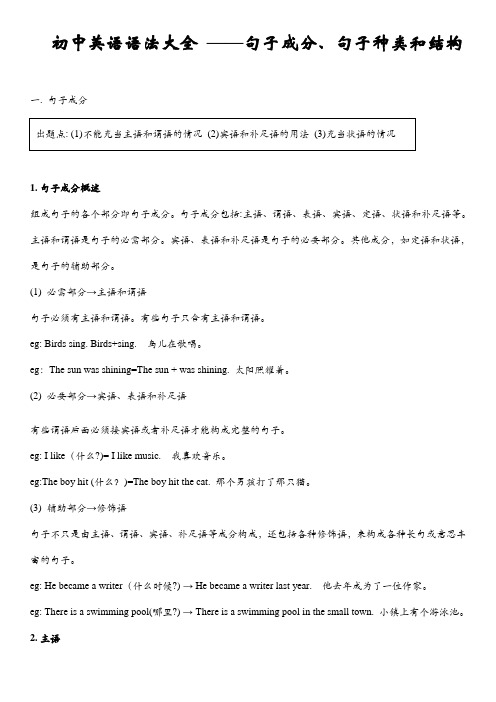
初中英语语法大全——句子成分、句子种类和结构一.句子成分1. 句子成分概述组成句子的各个部分即句子成分。
句子成分包括:主语、谓语、表语、宾语、定语、状语和补足语等。
主语和谓语是句子的必需部分。
宾语、表语和补足语是句子的必要部分。
其他成分,如定语和状语,是句子的辅助部分。
(1) 必需部分→主语和谓语句子必须有主语和谓语。
有些句子只含有主语和谓语。
eg: Birds sing. Birds+sing. 鸟儿在歌唱。
eg:The sun was shining=The sun + was shining. 太阳照耀着。
(2) 必要部分→宾语、表语和补足语有些谓语后面必须接宾语或者补足语才能构成完整的句子。
eg: I like(什么?)= I like music. 我喜欢音乐。
eg:The boy hit (什么?)=The boy hit the cat. 那个男孩打了那只猫。
(3) 辅助部分→修饰语句子不只是由主语、谓语、宾语、补足语等成分构成,还包括各种修饰语,来构成各种长句或意思丰富的句子。
eg: He became a writer(什么时候?) → He became a writer last year. 他去年成为了一位作家。
eg: There is a swimming pool(哪里?) →There is a swimming pool in the small town. 小镇上有个游泳池。
2. 主语主语是句中动作、行为、性质或状态的主体,是一个句子谈论的主题。
主语可以由名词、代词数词、不定式动名词(短语)、从句等来担任。
eg: A horse runs much faster than a cow.马比牛跑得快很多。
eg: We wish him success.我们祝愿他成功。
(3)谓语谓语用来说明主语的行为动作或所处的状态态。
谓语由动词充当,一般放在主语的后面。
谓语的中心词有人称、数和时态的变化。
陈述句的否定形式-文档资料
• ▲动词hope不发生否定中心转移:
• • • • •
• • • • • •
(2)形式上否定谓语,意义上状语: I didn’t come by bus.我不是坐车来的。 This great victory has not been won easily.这伟大的胜利来之不易。 4、半否定 (1)总括性代词、形容词或副词等和not连用时,表示半否定(也称部分否定);这 类总括词有all(一切,全体)both(二者,两)each或every(每个,人人)everyone (每个人,人人)everything(每件事,每件东西)everywhere(每个地方,各地) always(总是)altogether(全体)wholly(全部)等: Both are not correct.(或Not both are correct.) 并非两个都对。(只有一个对) 比较:Neither is correct。两个都不对。 Such a thing can’t be found everywhere.这种事并非到处可见。 Such a thing can be found nowhere.(或Such a thing can’t be found anywhere. ) 这种事什么地方也见不到。 完全否定: Both are useless.两者都没用。 We all dislike him.我们都不喜欢他。
• • • • • • • • • • • • • • • • •
③一般动词的否定句 句型:主语+do(does,did)+not+动词原形 注意:否定式的缩略形 is not →isn’t are not →aren’t was not →wasn’t were not →weren’t do not →don’t does not →doesn’t did not →didn’t can not →can’t will not →won’t must not →mustn’t have not →haven’t has not →hasn’t had not →hadn’t am not 无缩写形式,应为I’m not 形式。
含be动词的陈述句变否定句
• 6.This is a map of the U.S. • This is not (isn't) a map of the U.S. • 7.I am a worker. • I am not a worker. • 8.We are teachers. • We are not (aren't) teachers. • 9.These are apples. • These are not apples.
• 10.There is an apple on the desk. • There is not an apple on the desk. • 11.There are some pencils in the pencil
box. • There are not any pencils in the pencil box. • 12.You are a good boy. • You are not a good boy.
作业
• 1.It 's me. • 2.I am a good girl. • 3.This is a pencil box. • 4.You are a quiet girl. • 5.There are some ruler on the desk. • 6.There is a dog in the living room. • 7.They are my parents.
பைடு நூலகம்
含Be动词的陈述句变否定句
方法:在be动词(am,is,are)后加not,some变成 any.
• 1.He is a boy. • He is not (isn't) a boy. • 2.My sister is a beatiful girl. • My sister is not (isn't) a beatiful girl. • 3.My mother is a nurse. • My mother is not (isn't) a nurse. • 4.They are in the classroom. • They are not (aren't) in the classroom. • 5.There are some books in the classroom. • There are not any books in the classroom.
陈述句变为否定
Let me try!
1.She’s from America. 2.We are good friends. 3.They can swim well. 4.I go to school by bus.
陈述句变否定句
1. I’m number nine .
I’m not number nine .
I’m = I am
陈述句变否定句
2. They are dolphins.
are not = aren’t They aren’t dolphins.
陈述句变否定句
4.My mother is a teacher. My mother isn’t a teacher.
i3. He can swim.
can not = can’t
He can’t swim.
5. I like reading books. I don’t like reading books.
do not = don’t
陈述句变否定句
以上我们所设计到的陈述句变否定句的形式 有: • 1.be动词后+not • 2.情态动词can等后面+not • 3.用助动词do或者does后+not
人教(精通)版小学英语四年级下册
陈述句变 否定句
糙甸小学 马云秀
请将下列陈述句变为否定句
1. I’m number nine. 2. My mother is a teacher. 3. They are dolphins. 4. He can swim. 5. I like reading books.
陈述句的否定形式
陈述句的否定形式1. 用not构成的否定句:主语+助动词/情态动词/ be + not+…He is not back yet.We haven’t forgotten you.You shouldn’t be so silly.He won’t go, but they will.Money could not buy happiness.I like the salad, but I don’t like this soup.He wants a girl friend, but he doesn’t want to get married.You didn’t understand what I said, did you ?You needn’t try to explain.I didn’t use to like opera, but now I’m getting interested.I usedn’t to like opera, but now I’m getting interested.2. 祈使句的否定句:Don’t+动词原形…。
Don’t worry. I’ll look after you.Don’t believe a word he says.Don’t be so rude.3. 非谓语动词(不定式,分词,动名词)的否定式:把not放在to do; doing; 的前面。
It’s important not to worry.He said he deeply regretted not being able to help.Not knowing what to do, Shelly asked advice of her friend.He reproached me for not having told it to him.4. not与除谓语以外的其他句子成分连用:Come early, but not before six.It’s working, but not properly.I believe he will succeed, though no t without some difficulty.not用在I hope; I believe; I’m afraid; I guess; I suppose; I expect之后,构成省略句。
- 1、下载文档前请自行甄别文档内容的完整性,平台不提供额外的编辑、内容补充、找答案等附加服务。
- 2、"仅部分预览"的文档,不可在线预览部分如存在完整性等问题,可反馈申请退款(可完整预览的文档不适用该条件!)。
- 3、如文档侵犯您的权益,请联系客服反馈,我们会尽快为您处理(人工客服工作时间:9:00-18:30)。
• 习题 • 1、I go to work by car. I __ __ to work by car. • 2、You like these movies You __ __ these movies. • 3、Lee has lunch at two o’clock Lee __ __ lunch at two o’clock. • 4、 Mr crane works in a restaurant Mr crane __ __ in a restaurant. • 5、They go to visit the teacher They __ __ to visit the teacher . • 6、She is watching TV now. • 7、The cat runs fast. • 8、My grandpa gives me a hot dog. • 9、I have a ball. • 10、I am listening to music. • 11、Sarah can clean the classroom. • 12、There are some flowers in the vase. • 13、We need some milk. • 14、Su Hai and Su Yang live in a new house. • 15、Take the chair to the door. • 16、He did the housework yesterday. • 17、He does well in maths.
类总括词有all(一切,全体)both(二者,两)each或every(每个,人人)everyone (每个人,人人)everything(每件事,每件东西)everywhere(每个地方,各地) • always(总是)altogether(全体)wholly(全部)等: • Both are not correct.(或Not both are correct.) 并非两个都对。(只有一个对) • 比较:Neither is correct。两个都不对。 • Such a thing can’t be found everywhere.这种事并非到处可见。 • Such a thing can be found nowhere.(或Such a thing can’t be found anywhere. ) • 这种事什么地方也见不到。
• He doesn’t do his homework every day.他不是每天都做作业
• They didn’t have the class-meeting yesterday. • They don’t live in Shanghai. • ④现在完成时的否定句 • 句型:主语+have(has)+not+动词的过去分词…… • I haven’t finished reading the book yet.这本书我还没读完。 • He hasn’t had his breakfast yet. • ⑤过去完成时的否定句 • 句型:主语+had+not+过去分词…… • He hadn’t finished reading the book by the end of last month. • 截至上月末,他还没看完这本书。 • 注意:have表示“拥有”时,其否定句可以在have后直接加not,也可以在do、doe连用来表示否定 not的缩写式为n’t 直接在肯定句上加not;适用于绝大多数句子,not应加在谓语动词部分的第一个词(助动 词、情态动词、be动词、表示“拥有”的have)后,并常可与该词缩写成一体。 ①be动词的否定句 a.)句型:主语+be动词+not……
did的后面加not,此时have用原形。 • I haven’t a pen.=I don’t have a pen.我没有钢笔。 • He hasn’t a shirt.=He doesn’t have a shirt.
• 2、用具有否定意义的词来表示否定 • 这类词有no(不,没有)none(无人,没有任何东西)nobody(没人,谁也不)
• 18、Give me a bottle of milk. • 19、He had done with the goods before he went away. • 20、Tom has strong arms. • 21、I think he will come. • 22、Nancy drew some pictures yesterday. • 23、Both are right. • 24、Everything has been done.
• I can hardly(或 scarcely) recognize you.我几乎认不出你来了。 • He is seldom late.他很少迟到。 • Few people could do it. 当时很少有人能干这事。 • 5、双重否定 • 双重否定意为同一句中有两处具有否定含义。常译作“无…不…”或“没有…不…” • ;有时也译作肯定句,但比肯定句语气含蓄。 • A bird can’t fly without wings.鸟没有翅膀不能飞。 • Nobody is absent from the meeting.参加会议的人都到齐了。 • I could not help laughing when I saw it.当我看到这情景时,忍不住笑起来。 • (could not help doing sth 忍不住做某事) • 6、局部否定 • 局部否定意为被否定的不是全句而是句子的一部分,常见的有:
• ▲总括性单词和带有否定意义的前后缀的单词连用时,谓语动词使用肯定式,意思为
完全否定: • Both are useless.两者都没用。 • We all dislike him.我们都不喜欢他。
• (2)具有半否定意义的词可构成半否定句,这类半否定词有hardly(几乎不)seldom (很少)little(几乎没有)few(很少)nearly加否定词(几乎没有)almost加否定词 (几乎不)等:
• ▲动词hope不发生否定中心转移:
• I hope you weren’t ill.我想你没生病吧。
• (2)形式上否定谓语,意义上状语: • I didn’t come by bus.我不是坐车来的。 • This great victory has not been won easily.这伟大的胜利来之不易。 • 4、半否定 • (1)总括性代词、形容词或副词等和not连用时,表示半否定(也称部分否定);这
• (1)“not+非谓语动词”只否定非谓语动词: • Tell Li Ping not to open the door.告诉李萍别开门。 • (2)介词except, but, except for, apart from, beyond等,只否定自己的 宾语: • We went except(或but) him.除他(没去)外,我们都去了。
I can not do it myself.
You mustn’t take the books out.
• ③一般动词的否定句 • 句型:主语+do(does,did)+not+动词原形 • 注意:否定式的缩略形 • is not →isn’t • are not →aren’t • was not →wasn’t • were not →weren’t • do not →don’t • does not →doesn’t • did not →didn’t • can not →can’t • will not →won’t • must not →mustn’t • have not →haven’t • has not →hasn’t • had not →hadn’t • am not 无缩写形式,应为I’m not 形式。
nothing(没有东西,什么也没有)nowhere(哪儿也不)nohow(绝不,毫不) neither(两者皆不)never(永不,从不)dislike(不喜欢)disagree(不同意) useless(没有用)unimportant(不重要)及短语out of…,far from…,too…to… • No one is in the classroom.教室里没人。 • I like neither.两个我都不喜欢。 • He never tells a lie.他从不撒谎。 • The book is useless.这本书没有用。 • She dislikes him.她不喜欢他。 • The machine is out of work.这台机器不能工作了。 • He is too young to go to school.他太小,还不能上学。 • 3、否定中心转移 • (1)形式上否定主句,意义上否定宾语从句;这类动词有think,believe,suppose, feel,expect等: • I don’t think he has time to play with me.我想他没有时间和我玩。
I wasn’t good at English. / He isn’t hungry. b.)进行时和被动语态(现在时、过去时、进行时)都有be动词,所以它们的否定句与be 动词的否定句同形。 They aren’t cleaning the room.(现在进行时) The child was not looked after.(过去时的被动语态)这个孩子以前没有被照顾过。 c.)将来时(will,shall)、完成时及情态动词的被动语态不能用be动词的否定句型。 They will not be sent to the front.( √ )他们将不会被送到前线。 They will be not sent to the front.(×) ②情态动词的否定句 句型:主语+情态动词+not+动词原形
